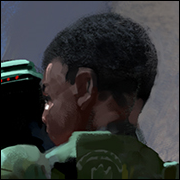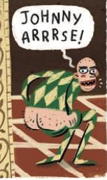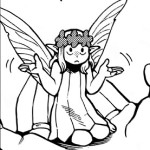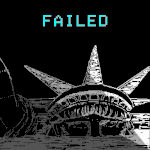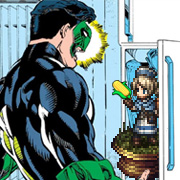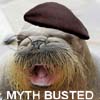|
The Rage of Achilles -- Terrence Hawkins' "gritty" retelling of the Iliad sometimes felt like it was getting almost parodic with how anachronistic some of the dialogue is, but it is generally entertaining. However, what is really interesting is his usage of the Bicameral Mind theory: the hallucinations of the gods speaking to the various characters are great, Odysseus as the first man to realize he's capable of hearing himself think is a highlight, as is Achilles' journey from one to the other. You just need to look past the sex, dicks, whores, etc. "grittiness." Ready, Okay! -- I only recently got around to reading Adam Cadre's debut and only novel. It is, unfortunately, sluggish and over-long. That said, it is also an interesting clockwork mechanism where everything has a deliberate point to it. Problem is, you spend about 90% of the book sifting gems out of dirt and waiting to get to the fireworks factory that was promised on the very first page, but when you do and everything comes together, it is great. What blows my mind about Ready, Okay! is that it feels like a pointed "deconstruction" of John Green's reified sadboy YA genre by way of Bowling for Columbine... years before either thing existed. Like, that is how you'd pitch this beast: Looking for Alaska meets Bowling for Columbine. Did Adam Cadre send this book back in time? Was the biggest mistake he made releasing this book like a decade early? I don't know if I can call it a good book or even one I enjoyed reading, but it's certainly unique and audacious. Think of a John Green novel with all the usual tropes and the quippy introvert nice guy protagonist but where the protagonist's zany family is the result of unsupported mental illnesses and generational trauma, you spend 400 pages getting to know a wide cast of teenagers with issues and varying degrees of sympathy, good and bad, and then every single one of them dies in a school shooting that is the explicit result of them being failed by every authority figure and institution that was supposed to protect them. It's absolutely wild. It's one of those five stars for ambition and ideas, two stars for execution books. You can easily see why it flopped when it was released by HarperCollins back in the day, but you kind of wish it was a hit bigger than it was.
|
|
|
|
|

|
| # ? Apr 27, 2024 12:24 |
|
After a multi-month dry spell due to having to read too many white papers for work, I finally picked up a book again. Burn Book: A Tech Love Story by Kara Swisher (Goodreads | Amazon) I was expecting a bit more substance, considering her background and experience - Swisher is one of the top tech journalists, in my opinion. I felt like each chapter ended a bit too early and that there were a lot of opportunities to go into detail where it felt like she deliberately left stuff out. Still, I found it to be entertaining and relatively accessible. I think you'll enjoy it if you go into it expecting it to be a 10,000-ft view of her experiences with the industry - or, maybe more accurately, of her experiencing the industry - and her interactions with some of its iconic personalities. However, if you're expecting a revelatory tell-all full of hidden truths or a detailed narrative of all that is wrong with the world (read: tech), you should probably look elsewhere. Final verdict: worth reading on a long flight but honestly I wish Kara would just release a curated anthology of experiences and essays like David Sedaris does... FreelanceSocialist fucked around with this message at 01:34 on Mar 29, 2024 |
|
|
|
Finished “For Whom The Bell Tolls” by Hemingway the other day. My first Hemingway book and I loved it - amazing prose and great story, there were so many passages I wanted to save. The book only takes place over a few days but encompasses politics, culture, religion, war, love, hate, philosophy… One of my favourite books now for sure.
|
|
|
|
Laurenz posted:Finished “For Whom The Bell Tolls” by Hemingway the other day. Yes! Another convert! One of my all-time favorite works and yet it is so hard to get people to even consider picking up a copy. Is it the age? The author? Does the title give people flashbacks to high school english class? I have no idea - but they don't know what they're missing.
|
|
|
|
Neoreaction: A Basilisk by Elizabeth Sandifer Oof, oh, ugh, ouch. This book, which is a series of variable-format impressionistic essays, was presented to me as an insightful or detailed analysis of the alt-right, and that's very clearly not what the author is going for. But a lot of it was downright frustrating and borderline offensive to read even taken on its own terms. I think Sandifer is a goon or goon-adjacent, so I'm not going to slam the book too hard, but it's pretty close to anti-informative. There's a general pattern of actions that make the book hard to read: 1. Explicit obscurantism done for its own sake, and not in a productive postmodernist sense where it informs the subject. A small, straightforward example from the relatively engaging and structured essay on Trump (the shorter essays are generally much stronger): quote:But then he literally built a six-hundred-and-sixty-six foot tower to which he offered up that name, sacrificing it upon its black altar such that the building became a titanic sigil of the sixteenth Major Arcana of the Tarot of the Golden Dawn, symbolizing destruction and ruin, 2. Claims and concepts, both accurate and false, tossed around without justification or explanation, not always coherently. All media is propaganda? Really? not going to flesh that out in any way, do any parsing there? Neoreaction being somehow surreptitiously a reaction to Marx? That's not explicit? Nick Land's shift to reactionary politics was a product of drug abuse? Might further biographical context help us out here? Useful ideas, like the well-traveled and obvious one that the lesswronger grey goo future AI framework looks an awful lot like religious belief and seems motivated by a pathological fear of death, are not interrogated on their own terms, and sometimes are used for the opposite purpose- the assumption that they must have a point. 3. The entire book is framed as accepting a nihilist premise that the world is doomed. This nihilism is used to both entertain aspects of the alt-right subjects and to dismiss discussion of how and why their views are formed or have appeal or explain anything rhetorically strong or weak. It's a constant assumption undermining concrete discussions, other than a couple spots where it gets lifted with oblique references to, e.g., Marxism being the solution to the inevitable doom of the world, with no further details. 4. Introducing a new subject of analysis, like a new alt-right figure or literary source, in the last few pages of an essay, then not finishing the explanation or connecting them back to the text. Sandifer's root desire seems to be to draw broad, metaphorical connections between concepts, regardless of whether they have any relevance, and then drop them. The concept of the hauntological, monsters, Basilisks in general, aren't ever actually set down and fully explained, but they reappear to paper over a lack of transitions throughout the text. 5. William fuckin' Blake. The titular essay ends with a virtual car crash: a twentyish page section that turns a discussion of the neoreactionary movement into an accounting of Blake's life and works. This is part of a larger effort to propose an alternate or rehabilitated version of some elements that Sandifer presents as driving neoreactionary thought, but why? Why would you want this? What is the benefit here? I get that Sandifer likes gnostic creative reasoning and Blake in particular (it really reads like she is reciting material from a grad thesis on him), but it's poorly attached even to the prior literary elements and concepts that she had built up over the previous 140 pages as an alternative to engaging with the subject. 6. Sandifer seems openly enamored of the rhetorics and practices of several of her (really horrible, globally harmful, bigoted) subjects. She spends a lot of time trying to find elements of their material to rehabilitate, which is fuckin' frustrating and weird when the reader is not given a sufficient understanding of the subject to even follow her down this path. Sandifer seems to hold the belief that saying weird new and possibly wrong things is a sort of innately beneficial exercise which okay, sure, I get the inductive-creative-deductive cycle. But there's not any strong reason to use, e.g., David Icke's racism as a launchboard for the exercise. Something can just be bad. It can be useful to understand how and why it is bad. You don't gotta bargain with the white supremacist ontology just because it's also weird. We don't need to reinvent the thule society. A standout is Mary Daly, a TERF who engages in eyerollingly bad figurative linguistic reconstruction work that Sandifer is plainly enamored of. That the author feels the drive to entertain and want to rehabilitate or mimic this approach is downright concerning, especially when she could do it with all the rest of existing literature. 7. Almost none of the essays have any conclusions, or at least any conclusions relating to the content of the essays. It's pretty common to paraphrase the "oh well we're all doomed" concept coupled with a stacked set of metaphors. The overarching conclusion at the end of the book is that the entire neoreactionary movement is made up of atomic, pure, undifferentiated stupidity, which, I didn't need to read 300 pages to know they're dumb or that their belief systems make you dumber. I wanted the how and why and what to do about it, and the book seemed contemptuous of the question, and more engaged with reactionary thought than interested in its opposition. As it stands I'm probably not going to hang on to this book, and I'm going to have to search for a different one that actually covers its subject. Divabot was apparently going to write one at one point, I need to see what he's been up to. Discendo Vox fucked around with this message at 08:33 on Mar 30, 2024 |
|
|
|
Interesting take. I've just finished Neoreaction and while I don't have the same objections or depth of reaction, it did leave me dissatisfied. Trying to summarize why: * it feels overly long and very discursive, going off on tangents that don't seem to add much. Sometimes it even seemed to dodge an interesting point to head off in another direction * This is the individual essays, but the book as a whole doesn't seem to fit together well and is just a collection of parts * Some of the arguments do seem to just end midstream * It does have a very nihilist / doomster tone I can't speak to the factual basis of the book but to me it does a decent job of dismantling the various reactionaries. However, I'd recommend that people only read the core essay, not the whole book.
|
|
|
|
Elric of Melnibone: the Elric Saga part 1, Stormbringer: the Elric Saga part 2 both by Michael Moorcock, and The Black Company by Glen Cook. The Elric sagas were omnibuses combining numerous different Elric books from Elric of Melnibone to Stormbringer. I wish I had read these earlier in my life because, wow, it turns out a lot of the media and games I've been consuming over the last two decades have been basically ripping directly from these stories. Elric is a swords and sorcery anti-hero who is basically the opposite of Conan the Barbarian in just about every way and he gets up to all kinds of swords and sorcery shenanigans while bemoaning his doomed DOOOOOMED fate and the miseries that the world has heaped upon him. Some of these stories were mediocre, some were excellent, and some were just weird (Sailor on the Seas of Fate, I'm looking at you). Overall I enjoyed the stories, but sometimes getting through a story was like swimming in the Heavy Seas. Moorcock's resolutions weren't all that great either, major plot events were wrapped up too hastily and were underwhelming in their resolution. Specifically, Yrrkoon and Arioch. You can really tell that Moorcock wrote a lot of these for magazines and that he had bills to pay and deadlines to make. There is - somehow - an even larger collection of Elric stories in a third omnibus that I have not yet read, but I have no idea how this is going to pickup where the second collection left off given that the ending seemed pretty definitive and was actually better than I was expecting. The Black Company was a pretty good book. It's basically the gritty fantasy war story narrative that GoT tried to be towards the end, but much better. I guess I would describe it as "what if the Vietnam war was fought by wizards?". I'm pretty sure I accidentally recreated this story in a game of Exalted that I ran about ten to twelve years ago, including one of the characters being a doctor-archer. The story is very big on the idea that winning battles does not mean winning a war and both of the 2-ish sides in the book are as beset by their members' own agendas as they are by enemy action. The Black Company is the first book in the volume that I bought, The Chronicles of the Black Company, and I think I will read the next two books in that volume before I go onto the third Elric omnibus. Ithle01 fucked around with this message at 20:09 on Mar 30, 2024 |
|
|
|
a bit ago i finished V by Thomas Pynchon, his first novel. it's told over the course of dozens of shifting POVs--some reoccurring and others just once. it's somewhat of a spy thriller, but that only describes some aspects of the work, itself full of different unique imagery like a woman having plastic surgery operated by her manipulative lover, or a radiologist describing his and others' slow descent into madness and leprosy in a villa surrounded by the lower classes. it's just that spy work also sometimes happens, and its effects ripple in instances of which there is none and vice versa. i found it fascinating as an introduction to Pynchon and would freely recommend it to a reader who won't mind getting lost in the passages. all the better if that feeling itself can be enjoyed
|
|
|
|
nonathlon posted:Interesting take. I've just finished Neoreaction and while I don't have the same objections or depth of reaction, it did leave me dissatisfied. Trying to summarize why: A good counterposition to mine; I likely had this reaction in part because I already knew the broad strokes about the book's various subjects, and because I tend to hold nonfiction to a pretty high (arguably unfair) standard, per my previous posts in this thread.
|
|
|
|
Ithle01 posted:Elric of Melnibone: the Elric Saga part 1, Stormbringer: the Elric Saga part 2 both by Michael Moorcock, and The Black Company by Glen Cook. Looking it up on Amazon, the third book appears to be the three Elric books Moorcock wrote in the early 2000s -- The Dreamthief's Daughter, The White Wolf's Son, and The Skrayling Tree. They're very different in content and style to the original Elric series, not the least because Moorcock was 35 years older. As a longtime Moorcock fan, I'd be interested to see how they read to someone coming to them fresh off the original series. I might recommend you read The War Hound and the World's Pain first to learn a bit about the von Bek family, who are heavily involved in Moorcock's post-80s work -- and it's one of his better stand-alone books anyway. Selachian fucked around with this message at 01:41 on Mar 31, 2024 |
|
|
|
Selachian posted:Looking it up on Amazon, the third book appears to be the three Elric books Moorcock wrote in the early 2000s -- The Dreamthief's Daughter, The White Wolf's Son, and The Skrayling Tree. They're very different in content and style to the original Elric series, not the least because Moorcock was 35 years older. As a longtime Moorcock fan, I'd be interested to see how they read to someone coming to them fresh off the original series. Thanks, I'll try to pick that up first. I'm probably not going to get around to this for a couple weeks because I'm going to get slammed by work this week and I'm going to finish the other two books in the Chronicles of the Black Company, but I will try to find some space for it. I read about ten pages of the final saga and my first thoughts were that this was a bit of a departure from the last saga. I was just hoping for more normal - whatever that means - Elric stories, but I guess I'll give this a try after I've had a chance to refresh my palate. edit: okay so I looked up The War Hound and the World's Pain and this is kind of funny. The book I read before the three I talked about in my post before this one was Between Two Fires and I put a bunch of similar books in my Amazon reading list, but I somehow managed to miss your recommendation despite trying to find books that are exactly what it is. So, double thank you for your reply to my post. Ithle01 fucked around with this message at 01:57 on Mar 31, 2024 |
|
|
|
Continuing on my Murderbot reread having just finished Network Effect. Again, by Martha Wells. I wasn't super into it the first time I read it a few years ago, but came away feeling much more positive on this reread. The main adventure plot of "Murderbot is abducted and has to protect the people caught up with it when the abduction happened" takes up most of the narrative, but a major secondary thread is the ongoing psychological effects of the first "book." Murderbot is clearly dealing with its own variety of PTSD from previous events but is also strongly in denial over it, and so as the narrator comes at the topic rather elliptically, swinging in and out from confronting the idea and some self-destructive tendencies. Oddly, while this book is spent entirely outside of the Corporate Rim (an array of star systems dominated by corporate powers, which the prior stories took place in), it feels like it says more about the CR than the prior stories did, this time from the outside looking in. The corporations are clearly awful and exploitative in the earlier stories, but Murderbot is still spending a lot of time in more public areas where the corps put on a good show of being prosperous and welcoming. But in this book, we see more about how they act away from the public eye, how the corporates even more aggressively exploit people on the fringes. And a glimpse at how brittle they really are, behind the facades of eternal profit and power.
|
|
|
|
The Bible Repairman and Other Stories by Tim Powers: I picked this short story collection up in some bundle or another, and it was on my Kindle already so I gave it a go during a recent trip. I am not familiar with the author, but I see he's won some awards for his sci-fi / fantasy writing. It was an easy and entertaining read. The stories all focus on the afterlife in some fashion, and they each drop you into the middle of an existing world. He does a good job bringing you into the worlds he built in each short story without a lot of exposition (though, "The Hour of Babel" was a bit confusing). I was intrigued by each premise and often wished they were longer. The titular story "The Bible Repairman," in particular, had me hoping it became a full book at some point, but that doesn't appear to be the case. A good read overall.
|
|
|
|
A Libertarian Walks Into a Bear by Matthew Hongoltz-Hetling A bunch of They are surrounded by bears. A lot of bears. This dude interviews lots of the selfish arsehole people and eventually writes this book. Much to my amazement, he always manages to let them talk and never once points out they are all loving moronic selfish arsehole people. All of them. You will root for the bears, man you will root for the bears. Also there's a llama named Hurricane who is so cool and badass it takes on a bear and wins gently caress all these people. Since I got the paperback, there's an addendum at the end. You will be unshocked to hear they are overwhelmingly Trump supporters. GO BEARS!
|
|
|
|
The Silo series; Wool, shift and dust An interesting, fallout-esque trilogy that spends a lot of time on the politics of life in a giant underground community. Author has a very thinly veiled fetish for mechanical engineering and a not veiled at all hatred for IT people which is kinda funny. How To Sell A Haunted House - Grady Hendrix This was my second Hendrix book, having read my best friends exorcism previously. I enjoyed this one much more, it feels somehow less mean but also more scary and I vibed with the themes of family dysfunction and repression. In the horror thread someone described her writing as "goosebumps for adults" and I'd still agree with that as well!
|
|
|
|
I just read, in relatively rapid succession The Dispossessed Masterpiece, not that I have to say that for anything in this post, really. This is my first foray into Le Guin other than Wizard of Earthsea, and I'm blown away. The book felt heavy in a way I'm not usually reading, every chapter meaningful, clear even with the jumping around in perspective between the various times of the narrative. Loved it. Made me want to read more Hainish. The Left Hand of Darkness Been on my list for forever, because, well. I think this must have been a recent edition (borrowed ebook) because it had a foreword and a post...word? that talked about gender in very modern terms. Loved it, bittersweet ending, I think in the end it sits a little below The Dispossessed for me. The Lathe of Heaven This one felt personal. I have memory issues, and found Eternal Sunshine of the Spotless Mind one of the scariest pieces of entertainment in existence, literally gave me nightmares. I was on edge for every page, and had to put it down after a couple chapters at a time for most of the book. Glad I read it, hard to rank it in any way given the subject matter. So, uh, hot take, Le Guin was a really good author.
|
|
|
|
|
Moon Lake, The Donut Legion, Jane Goes North by Joe R Lansdale, Champion Mojo Storyteller. Never read anything by him I didn't like. His most famous (so to speak) works would be the Hap and Leonard series, Bubba Ho-Tep and, probably, Cold in July. Anyway, all three of these are, to my knowledge, stand-alones. Moon Lake is about buried secrets in a small (East) Texas town and a quick and solid read although pretty much all his stuff rattles along. The Donut Legion is a tad odd in that I have the strong suspicion it started as a Hap and Leonard book and then Joe R changed it to be set in his town of Nacogdoches and just referenced all the poo poo he likes (He does that sort of thing in other works, like throwing out a shameless plug for his daughter's music career). It is good fun, with his sense of the absurd that threads through real life. Jane Goes North is a novella jam-packed full of gently caress yes and hilarity. Weirdly slight but profound and is about Jane going North to her (hypothetically) more successful sister's wedding and the road trip she takes with a woman who gives her a lift and, of course, all the shenanigans that ensue. If you can, I would recommend tracking down some of his collected short stories, especially any that contain Godzilla's Twelve Step Program, which is only like six or eight pages long and is an absolute banger.
|
|
|
|
Mexican Gothic by Silvia Moreno Garcia This really was a mess. Nothing terribly Mexican about it, other than it takes place in Mexico. The Gothic part is there, but feels bolted on, bereft of any sense of horror or foreboding. It's as if Garcia had a checklist of Gothic tropes that she threw in without understanding how they work together. The protagonist was interesting at first: a whipsmart debutante making the rounds of the party scene in 1950s Mexico City. But when she's compelled to check in on a cousin who may be trapped in both a bad marriage and a foreboding mansion, her intelligence seems to drop according to the needs of the plot. The supernatural aspect of the novel doesn't bear close examination, and quickly topples into ridiculousness. The ending is genuinely eye rolling. This book was on Canada Reads, the CBC fronted celebration of Canadian writers. I suppose to the purveyors of high literature coffee table books that eagerly flock to such events, this trip into genre fiction was a delight. A sideshow, a ride through an amusement park. A bit of literary slumming. But for anyone who enjoys horror fiction, who appreciates the effort it takes to make it work, it's just a massive disappointment.
|
|
|
|
silvergoose posted:I just read, in relatively rapid succession She's my favorite! I am rereading Left Hand of Darkness right now with some folks. I read it aloud each week and record it. It's so fun returning to it. I think Changing Planes is one of her most underrated books. Loved it.
|
|
|
Robot Wendigo posted:Mexican Gothic by Silvia Moreno Garcia You really identified what didn’t work for me about that book
|
|
|
|
|
my experience of it was “what if resident evil 4 made even less sense” e: i did kinda like it once i accepted it was less gothic fiction and more b-movieish pulp
|
|
|
|
Piranesi How loving angry am I that it turned into copaganda!
|
|
|
|
Moonshadow by Teddy Harrison (as Thea Harrison): Paranormal romance isn't my go-to for a book, but I try to regularly mix in one of the myriad ebooks I've acquired over the years in an attempt to discover something new on my own (vs books I've been recommended). I guess it's part of a trilogy from her larger Elder Races world, which is a bunch of paranormal romance novels and novellas. Looking at her bibliography, she writes a lot. Sophie is a half-djinn who takes no poo poo from anyone and is an independent woman to a fault. Nikolas is a centuries old mix of several fantasy races who is used to being in command. Sophie is roped into a war that Nikolas has been a part of for a long time and ends up being an enormous help to him and his compatriots. They butt heads often and have sex about as much. There's a lot of tension built from people not talking to each other, which I am never a fan of. It was an okay read, and I liked the glimpse of the world that the author has built, but I'm not going to try to finish the trilogy or explore any other books in this universe. Good-Natured Filth fucked around with this message at 02:36 on Apr 11, 2024 |
|
|
|
Circe by Madeline Miller. An enjoyable read, weaving the mythological stories into Circe's own perspective narrative. Pleasant style (though some of the descriptions became a bit too flowery and nonsensical, but hey, gods are weird). Interesting to see the feminist perspectives, too. silvergoose posted:The Left Hand of Darkness I really wonder what it is that I missed about Left Hand of Darkness. I found it fine, but nothing really remarkable. Neither the style nor content made me move towards starting on the Earthsea anthology that I bought alongside it. Maybe the hype just made me expect too much. Aeble fucked around with this message at 23:46 on Apr 14, 2024 |
|
|
|
|
That's like my reaction to The Dispossessed: it was perfectly fine, but I wasn't bowled over. There's a few strawmen, the idealistic "good" side have a miserable existence, and I wasn't sure what it was trying to say. But maybe I missed something, maybe I was in the wrong place when I read it.
|
|
|
|
Just finished Observer: A Novel by Robert Lanza and Nancy Kress. It was... eh, not quiet a slog but not really anything too exciting or new. The pacing was off IMO in the beginning, it took a while to get to the main ideas presented in the book. I think the intention was to build a bit more of character/back story but it just kind of fell flat for me, as did the actual plot, which I did not personally find to be compelling. I did finish the book, but just kind of wanted it to be over by the end. Ah well, next book on the list is You, Me, and Ulysses S. Grant by Brad Neely.
|
|
|
|
Having just finished Empire of the Ants by Bernard Weber I feel like I'm going to return to never reading any French book more recent than the Count of Monte Cristo. It's meandering, weird, seems to have no point, has nothing approaching a traditional story structure, the ants are written more like real people than the humans are and the author is some sort of hardcore racist who considers understanding foreigners like Tibetans, Hindus or the Japanese to be as complex and impossible as understanding ants.
|
|
|
|
Just finished The Colour Of Magic and The Light Fantastic by Sir Terry Pratchett. I am now a dozen pages into Equal Rites. This is going to consume the next few months of my life, won't it?
|
|
|
PurpleXVI posted:Having just finished Empire of the Ants by Bernard Weber I feel like I'm going to return to never reading any French book more recent than the Count of Monte Cristo. It's meandering, weird, seems to have no point, has nothing approaching a traditional story structure, the ants are written more like real people than the humans are and the author is some sort of hardcore racist who considers understanding foreigners like Tibetans, Hindus or the Japanese to be as complex and impossible as understanding ants.
|
|
|
|
|
FreelanceSocialist posted:Just finished The Colour Of Magic and The Light Fantastic by Sir Terry Pratchett. I am now a dozen pages into Equal Rites. This is going to consume the next few months of my life, won't it? Months?
|
|
|
|
FreelanceSocialist posted:Just finished The Colour Of Magic and The Light Fantastic by Sir Terry Pratchett. I am now a dozen pages into Equal Rites. This is going to consume the next few months of my life, won't it? Ah, publication order. A goon of culture I see. And yes.
|
|
|
|
FreelanceSocialist posted:Just finished The Colour Of Magic and The Light Fantastic by Sir Terry Pratchett. I am now a dozen pages into Equal Rites. This is going to consume the next few months of my life, won't it? I'm so jealous. Also months? You're good for at least a year, probably more depending on how much/fast you read. It's drat near two decades I've been reading Pratchett and I still read or listen to the audiobooks on a frequent basis, and every time I still discover new jokes or insights. It's my go-to thing to listen to and fall asleep with and I've really come to appreciate just how incredibly dense with jokes and meaning they are. Some of them I must've consumed a dozen times now and I still discover new things. Throwaway lines that seem insignificant but are a reference to or joke about stuff from other novels and poo poo, insights I didn't get before, things hit different because I'm older or in a different place in my life. Also even though the first couple of novels are pretty great, it gets so, so much better. If you loved these you're going to absolutely adore the rest. If there's one author whose works I could just completely wipe from memory and experience for the first time again it would be Pratchett. Or Banks. Tough call.
|
|
|
|
FreelanceSocialist posted:Just finished The Colour Of Magic and The Light Fantastic by Sir Terry Pratchett. I am now a dozen pages into Equal Rites. This is going to consume the next few months of my life, won't it? You just finished his weakest works and you already can’t get enough. RIP
|
|
|
|
The Alchemist by Paulo Coelho: A fable about a boy trying to find his destiny. The author's philosophy and religion were front and center the entire time, and the writing was simplistic. The message of the book is essentially "don't be afraid to reach for your dreams," but also "if you don't do this, you're wasting your life." Additionally, "destinies are for men only." I didn't care for it.
|
|
|
|
It is the single worst book I've ever read. I wish for nothing but misery and misfortune for Mr.Coelho. Diet The Secret garbage.
|
|
|
|
I can't remember a single thing about the alchemist including why I read it in the first place
|
|
|
|
I know that Elizabeth Holmes gave every employee at Theranos a copy, and what else would I ever want to know?
|
|
|
|
The Alchemist read like something a first year philosophy major would write who had no real hardship in their life. From my understanding, it has a Jonathan Livingston Seagull level cult following surrounding it. Which makes sense, since JLS is also a "deeply philosophical" book that is about as deep as a rain puddle.
|
|
|
Good-Natured Filth posted:The Alchemist by Paulo Coelho: A fable about a boy trying to find his destiny. The author's philosophy and religion were front and center the entire time, and the writing was simplistic. The message of the book is essentially "don't be afraid to reach for your dreams," but also "if you don't do this, you're wasting your life." Additionally, "destinies are for men only." I didn't care for it.
|
|
|
|
|

|
| # ? Apr 27, 2024 12:24 |
|
I just finished The Adventures of Tom Sawyer and it was cool and good. I remember reading it in like 4th grade or something but only remember bits and pieces and certainly didn't appreciate it for what it was then. I'm probably going to read Huck Finn next because I've never read it and it seems like a good place to go.
|
|
|



